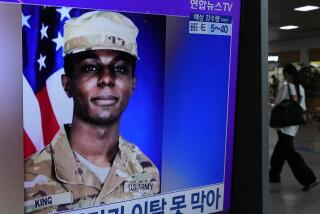U.S. Accepts 2 Defecting N. Korean Diplomats
- Share via
WASHINGTON — The Clinton administration accepted two top-level defectors from North Korea on Tuesday--the country’s ambassador to Egypt and his brother, also a diplomat--setting up a potential intelligence bonanza for Washington and its allies.
State Department spokesman James P. Rubin announced the defection of Chang Sung Gil, the ambassador, and his brother, Chang Sung Ho, a commercial counselor at the North Korean mission in Paris. The ambassador is the highest-ranking diplomat to defect from the secretive Communist-ruled nation.
Rubin said the wives of both brothers also defected, as did Chang Sung Ho’s two children.
Although Rubin originally said the defectors had been granted political asylum in the United States, he called reporters later to say the North Koreans had been admitted on immigration “parole.” He said they had requested asylum and “we expect it will be granted” but that the process had not yet been completed. He said the defectors are in the U.S., but he declined to say where or to predict when they will appear in public.
Although Rubin also declined to specify the sort of intelligence Chang has brought with him, there were news reports that the ambassador has important information about North Korea’s missile sales to Iran and Syria. As the North’s top diplomat in the Middle East and before that a vice foreign minister, Chang almost certainly had access to the details of North Korea’s clandestine missile export program.
“It is quite an intelligence coup,” said Jae Ku, an expert on Korea at the Center for Strategic and International Studies, a Washington think tank. “He had day-to-day knowledge of North Korea’s foreign relations. If he cooperates with U.S. officials, I think we will learn a lot of important information.”
Ku said Chang is potentially a more important source of information than Hwang Jang Yop, a ranking member of the North Korean leadership who defected to South Korea in February. Hwang, the North’s top Communist ideologist before his defection, claimed that the government in Pyongyang was preparing for a new war against South Korea, although Western intelligence analysts expressed doubts about the quality of his information.
North Korea reacted angrily to this week’s defections. The Reuters news agency quoted a North Korean diplomat in Paris as calling the brothers “criminals” and chiding the United States for taking them in.
U.S. officials and outside experts said the incident certainly will put a new chill on Washington-Pyongyang relations, but, with North Korea in the grip of a food crisis, the regime of Kim Jong Il has few cards to play. A strident response to the defections would jeopardize North Korea’s chances of getting needed food aid from the United States and the West.
Nevertheless, the defections may overshadow negotiations scheduled for today in New York on missile proliferation issues. Washington hopes to persuade Pyongyang to curb its missile sales and to sign an international agreement restricting missile exports.
“As you know, we have very serious concerns about missile proliferation,” Rubin said. “We don’t believe this will have any effect on the missile talks.”
Some outside experts expressed doubts. In the past, North Korea has often boycotted long-scheduled meetings to drive home political points.
“I don’t think they will turn up,” Ku said. “I think they will need some time to think about the implications of the defections.”
In the past, North Korea delivered entire missile systems to Iran. Tehran now has its own missile program, but it still receives technology and training from North Korea.
North Korea recently accepted in principle a joint U.S.-South Korean proposal for a peace conference to write an official end to the Korean War, replacing the shaky truce that stopped the fighting in 1953. North Korea’s ally in that conflict, China, also is supposed to attend.
Preliminary talks are scheduled for next month in Geneva. No date has been set for the full-scale conference.
Rubin said it was premature to say whether the United States will give South Korean officials access to the brothers. The government in Seoul has said that it wants to question them.
According to news service reports from Cairo and Seoul, Chang did not show up for work at his embassy Friday. These reports say he sought asylum at the U.S. Embassy in Cairo and was spirited out of Egypt using a false name.
Rep. Jane Harman (D-Torrance), who visited North Korea last week as a member of a congressional delegation, said the defection was evidence that Pyongyang “is a deeply troubled regime.” She called on the administration to “increase the pressure on the diplomatic front to find a peaceful resolution” to the long-festering disputes on the Korean peninsula.
“There is a mutual interest in continuing to talk,” she said.
More to Read
Sign up for Essential California
The most important California stories and recommendations in your inbox every morning.
You may occasionally receive promotional content from the Los Angeles Times.










